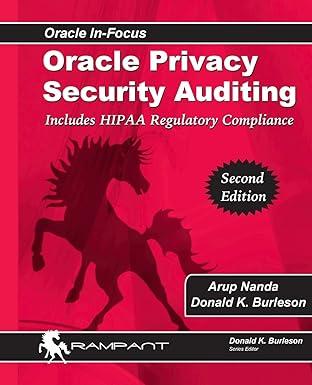Question
The Discussion here is the equivalent in an online course to face-to-face discussion in a classroom-based course. This is the place where you discuss course
The Discussion here is the equivalent in an online course to face-to-face discussion in a classroom-based course. This is the place where you discuss course topics with the instructor and each other. Just as in a regular classroom, a good deal of learning takes place through the interaction that these discussions will stimulate. They will test your ability to critically evaluate the positions of the philosophers we are studying.
Directions
A course in ethics should help us to make decisions about right or wrong. This is not the same as a discussion of what is legal. This is what you should do regardless of whether you get caught or not. At this point you should have read excerpts from Plato and Aristotle. These philosophers attempted to devise ways for us to determine how to make the morally correct choice. In your posts I want you to apply each theory to the fact and determine whether the theory is helpful.
By the time Oliver was 15 years old he had been to 7 different foster homes. He understood by the time he was 10 that he would not be adopted and would continue to be shuffled through the system until he "aged out," as they called it. He wasn't a bad student and despite his moving around, he managed to do ok in school. Although, he hadn't remained in anyone's home long enough to make any lasting relationships, he managed to make friends on the street with criminals who amicably referred to him as "family." Regardless of where he moved, he could catch a bus to their neighborhood and they would give him something to eat and a few dollars to buy himself something. Oliver knew they broke the law but as time passed he started to view them as the good guys in I guess what some would think of as a Robin Hood sort of way. Around 15 they started to suggest he move in with them and find a real home. Some would say that the system had failed him, but as far as those outlaws were concerned, the system hadn't failed Oliver, it had only done what it was supposed to do, look out for the privileged and disregard the rest. Oliver had some encounters with church and other adults, but he started to wonder how do we know what is right and what is wrong. In his free time he has read the same excerpts from Plato and Aristotle that you have.
In ONE consolidated post of at least 600 words, explain to Oliver how:
- Euthyphro's dilemma helps us understand the relationship between religion and ethics.
- Whether the discussion of Justice between Socrates and his friends in Book I of the Republic can help him decide what to do.
- Whether using the Doctrine of the Mean can help him decide what he should do.
- What you think he should do based on what you have learned and your personal perspective.
Additionally, write at least four response posts totaling 400 words (about 100 words each).
- Each of your five posts must be done on a different calendar day.
- The word count for all of the five posts must add up to 1000 words including an initial post of 600 words + four responses of 100 words each.
- At least one of your response posts must be to the initial post of a fellow student.
- You may respond twice to the same student if engaging in dialogue with that student.
- Please respond meaningfully to your classmate's posts, and ensure you always remain civil and respectful.
Step by Step Solution
There are 3 Steps involved in it
Step: 1

Get Instant Access to Expert-Tailored Solutions
See step-by-step solutions with expert insights and AI powered tools for academic success
Step: 2

Step: 3

Ace Your Homework with AI
Get the answers you need in no time with our AI-driven, step-by-step assistance
Get Started


